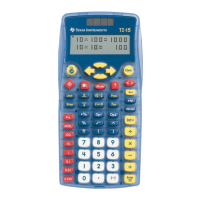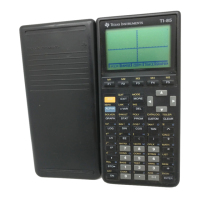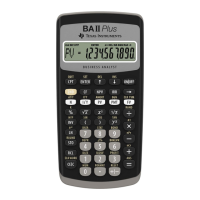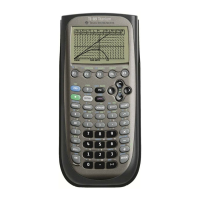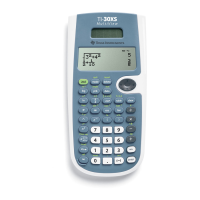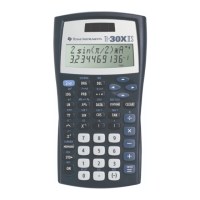Appendix A: Functions and Instructions 911
variable
_
When
variable
has no value, it is treated as
though it represents a complex number. By
default, without the _
, the variable is treated
as real.
If
variable
has a value, the _ is ignored and
variable
retains its original data type.
Note: You can store a complex number to a
variable without using _
. However, for best
results in calculations such as
cSolve() and
cZeros(), the _ is recommended.
Assuming z is undefined:
real(z) ¸ z
real(z_)
¸ real(z_)
imag(z)
¸ 0
imag(z_)
¸ imag(z_)
4
44
4 (convert) 2 key
expression_unit1
4
44
4 _
unit2
⇒
⇒⇒
⇒
expression_unit2
Converts an expression from one unit to another.
The units must be in the same category.
The _ underscore character designates the units.
For a list of valid pre-defined units, refer to the
module about constants and measurement units.
You can press ¥À to select units from a
menu, or you can type the unit names directly.
To get the _ underscore when typing units
directly, press 2
Note: The 4 conversion operator does not handle
temperature units. Use
tmpCnv() and
@
@@
@tmpCnv() instead.
3_m 4 _ft ¸ 9.842…ø_ft
10^() CATALOG
10^ (
expression1
) ⇒
⇒⇒
⇒
expression
10^ (
list1
) ⇒
⇒⇒
⇒
list
Returns 10 raised to the power of the argument.
For a list, returns 10 raised to the power of the
elements in
list1
.
10^(1.5) ¸ 31.622...
10^{0,
ë 2,2,a} ¸
{1
1
100
100 10
a
}
10^(
squareMatrix1
) ⇒
⇒⇒
⇒
squareMatrix
Returns 10 raised to the power of
squareMatrix1
.
This is
not
the same as calculating 10 raised to
the power of each element. For information about
the calculation method, refer to
cos().
squareMatrix1
must be diagonalizable. The result
always contains floating-point numbers.
10^([1,5,3;4,2,1;6,L2,1]) ¸
1.143…E7 8.171…E6 6.675…E6
9.956…
E6 7.115…E6 5.813…E6
7.652…
E6 5.469…E6 4.468…E6
xê CATALOG (^
-1
)
expression1
xê ⇒
⇒⇒
⇒
expression
list1
xê ⇒
⇒⇒
⇒
list
Returns the reciprocal of the argument.
For a list, returns the reciprocals of the elements
in
list1
.
3.1^ë 1 ¸ .322581
{a,4,
ë.1,xì 2}^ë 1 ¸
{
1
a
1
4
ë 10.
1
x
ì 2
}

